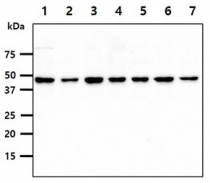ARG57083
anti-PSMD11 antibody [2C7]
anti-PSMD11 antibody [2C7] for Western blot and Human
Overview
| Product Description | Mouse Monoclonal antibody [2C7] recognizes PSMD11 |
|---|---|
| Tested Reactivity | Hu |
| Tested Application | WB |
| Host | Mouse |
| Clonality | Monoclonal |
| Clone | 2C7 |
| Isotype | IgG2b, kappa |
| Target Name | PSMD11 |
| Antigen Species | Human |
| Immunogen | Recombinant fragment around aa. 1-422 of Human PSMD11. |
| Conjugation | Un-conjugated |
| Alternate Names | S9; 26S proteasome non-ATPase regulatory subunit 11; Rpn6; p44.5; 26S proteasome regulatory subunit S9; 26S proteasome regulatory subunit RPN6; 26S proteasome regulatory subunit p44.5 |
Application Instructions
| Application Suggestion |
|
||||
|---|---|---|---|---|---|
| Application Note | * The dilutions indicate recommended starting dilutions and the optimal dilutions or concentrations should be determined by the scientist. |
Properties
| Form | Liquid |
|---|---|
| Purification | Purification with Protein A. |
| Buffer | PBS (pH 7.4), 0.02% Sodium azide and 10% Glycerol. |
| Preservative | 0.02% Sodium azide |
| Stabilizer | 10% Glycerol |
| Concentration | 1 mg/ml |
| Storage Instruction | For continuous use, store undiluted antibody at 2-8°C for up to a week. For long-term storage, aliquot and store at -20°C. Storage in frost free freezers is not recommended. Avoid repeated freeze/thaw cycles. Suggest spin the vial prior to opening. The antibody solution should be gently mixed before use. |
| Note | For laboratory research only, not for drug, diagnostic or other use. |
Bioinformation
| Database Links |
Swiss-port # O00231 Human 26S proteasome non-ATPase regulatory subunit 11 |
|---|---|
| Gene Symbol | PSMD11 |
| Gene Full Name | proteasome 26S subunit, non-ATPase 11 |
| Background | The 26S proteasome is a multicatalytic proteinase complex with a highly ordered structure composed of 2 complexes, a 20S core and a 19S regulator. The 20S core is composed of 4 rings of 28 non-identical subunits; 2 rings are composed of 7 alpha subunits and 2 rings are composed of 7 beta subunits. The 19S regulator is composed of a base, which contains 6 ATPase subunits and 2 non-ATPase subunits, and a lid, which contains up to 10 non-ATPase subunits. Proteasomes are distributed throughout eukaryotic cells at a high concentration and cleave peptides in an ATP/ubiquitin-dependent process in a non-lysosomal pathway. This gene encodes a member of the proteasome subunit S9 family that functions as a non-ATPase subunit of the 19S regulator and is phosphorylated by AMP-activated protein kinase. Alternatively spliced transcript variants have been observed for this gene. [provided by RefSeq, Jul 2012] |
| Function | Component of the lid subcomplex of the 26S proteasome, a multiprotein complex involved in the ATP-dependent degradation of ubiquitinated proteins. In the complex, PSMD11 is required for proteasome assembly. Plays a key role in increased proteasome activity in embryonic stem cells (ESCs): its high expression in ESCs promotes enhanced assembly of the 26S proteasome, followed by higher proteasome activity. [UniProt] |
| Calculated MW | 47 kDa |
| PTM | Phosphorylated by AMPK. |
Images (1) Click the Picture to Zoom In






